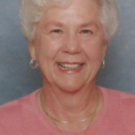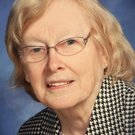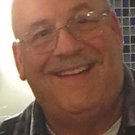Hedi McKinley
Hedi McKinley endured immense hardship in her long life and yet considered herself lucky. She was thrown out of her childhood home by Nazis, and later buried three beloved husbands yet she still had a clear-eyed love of life — and of helping others.
A social worker, professor, and author, Ms. McKinley was well known locally for the practical and insightful advice she gave on local radio and television stations and as a columnist for The Altamont Enterprise.
On Tuesday, Sept. 20, 2022, “she died peacefully and without pain and with two caretakers holding her hands,” said her cousin Claire Lissance. “Dying alone was her biggest fear.” Ms. McKinley was 102.
She was born in Vienna, Austria, the only child of Karl Faludi and Mascha Deutsch, whom she described as poor shopkeepers. “My mother and father had what you would call a mom-and-pop store,” Ms. McKinley told The Enterprise. “My father sold chickens, eggs, geese, fish, and butter. We lived on top. My parents worked all day in the store, six days a week.”
Her father’s family was so poor that he had to go to work at age 12. He joined the army as a young man, fighting in World War I. He was wounded, taken prisoner by the Russians, and spent four years in Siberia. “When the war was over, he had to walk home to Austria … It took a year,” Ms. McKinley said.
At age 10, Ms. McKinley won a prize in a city-wide essay contest. The subject was bread; she wrote about it in both the actual and metaphorical sense. “That was an indication,” said Ms. McKinley, who frequently organized her thoughts, both in speaking and writing, by listing, “an indication that — A, I was a bright child, and B, interested in writing.”
Ms. McKinley loved to read and spent much of her youth at the public library. As a teenager, she read newspapers at the library and tried to warn her parents about what the Nazis were doing in Germany. She used one of her trips to the library to consult a phone book of London from which she copied the addresses of people whose names looked Jewish.
“When Hitler invaded, it was very sudden, and the Austrian government fell,” said Ms McKinley. “The Germans took over and ran Austria. The persecution of Jews began. My parents lost their store right away. There was a big sign saying, ‘Don’t buy from Jews.’ Everybody lost their livelihood.”
On Nov. 9, 1938, when Ms. McKinley was 18, her family was evicted from their home. It was Kristallnacht, which means “night of broken glass” in German, the night on which the Nazis coordinated an attack on Jewish people and their property in Germany and in German-controlled lands like Austria.
“It was 10 degrees below zero, extremely cold,” Ms. McKinley recalled. “Two young boys, about 16 years old, came and knocked at our door and said ‘Out!’ We were on the streets. They let us take nothing. We were on the streets without our winter coats.”
She went on, “There were possibilities of getting killed, getting raped, getting sent to concentration camps. I was lucky.” She had written to the people with Jewish-sounding names from the London phone book and asked, “Can you get me a job as a housemaid?”
“Lo and behold, somebody answered,” she said. “I was able to leave and go to England.”
Her parents were still in Vienna, hiding. “If a man was found, he would be sent to the camps. There was no way of communicating,” Ms. McKinley said. With help from an uncle, she and her parents eventually came to America.
“I always wanted to come to America,” said Ms. McKinley. “It seemed to be unfettered, and open to the kind of person I was. My mother had wanted me to get married, have children, have a traditional life. But I wanted something different, something more.”
She stressed that, of the family members sponsored by her uncle in America, “Not one of us ever took any money from the American government. We started working the day we came. He picked me up from the ship on Sunday and I started work on Monday as a housemaid.”
Ms. McKinley learned about a general studies program at Columbia University for working people who would take classes at night so she earned a bachelor’s degree, and later a master’s degree, from Columbia while supporting herself as a waitress.
“It was pure joy,” said Ms. McKinley. “I used to stand there and just look at the school and say, ‘I can’t believe I’m here.’ I was surrounded by intelligent people and books.”
Ms. McKinley was inducted into Phi Beta Kappa, the oldest and most prestigious national honor society, and she graduated magna cum laude.
She decided on social work for a career, Ms. McKinley said, because she “wanted to make the world better. You can help a lot of people in social work. Especially in this country, I wanted to give back; I felt grateful.”
After living in Greenwich Village, Ms. McKinley moved to the Capital Region for a job in Schenectady at the Family and Child Service. She went on to work at the Ellis Psychiatric Clinic and taught at the University at Albany.
“It was all through lucky circumstances,” she said.
She published scholarly articles on a wide variety of subjects. Her first article to be published, in the 1960s in the American Journal of Nursing, was on the importance of nurses and social workers setting aside their professional “armor” and “being human in the face of suffering.”
Another article, published in the 1970s in Health and Social Work, details the death of sexual expression in nursing homes. “Although the calming effects of physical closeness are well known — we hold crying babies, hug upset children, embrace sick adults — older persons have hardly any pleasurable physical contact,” Ms. McKinley wrote, concluding, “Persons in nursing homes must abide by a set of unrealistic rules and are targets of prejudice and punitive morality.”
As a professor of the University at Albany School of Social Welfare, Ms. McKinley started the Community and Public Services Program where students get course credit for volunteering in programs that range from serving in prisons to helping in nursing homes.
Ms. McKinley said the program helped the students as much as the people they were serving. “These are Long Island, spoiled rich kids working in programs like Big Brothers, and they write, ‘I didn’t know there were kids who didn’t have breakfast because they are so poor.’ It’s an entirely new world for them,” she said.
While she was running the community-service program, Ms. McKinley launched a career as a radio personality. For 12 years, she was a regular on Elle Pankin’s popular Monday afternoon show and she also had a five-year stint on Channel 10 news, answering mental-health questions.
Fans would stop her on the street in Albany. “They appreciated the way we discussed women’s issues,” Ms. McKinley said.
At the same time, she had a private practice in Albany that she kept up into her nineties.
For a quarter of a century, Ms. McKinley wrote a column, “Mental Health Notes,” for The Enterprise. She delivered the typewritten columns in person to the Enterprise newsroom, often with words of advice. Her columns were short, easy to read, and loaded with practical advice.
“I don’t pussyfoot around,” Ms. McKinley said.
In her columns, she took on many difficult topics, sometimes with humor, always with good will. One column, for example, was on the need for parents to have “the conversation” with their grown children about how they wanted to die. “‘Some other time’ might be too late,” she wrote.
She also wrote, in the midst of news breaking on the conduct of American guards and supervisors at Guantanamo and Abu Ghraib, about the difference between cruelty and sadism.
Another column started, “We’ve all seen them, two elderly people sitting silently across each other in the restaurant or diner, staring past each other in a dull deadening silence.” She then answered this question: “So, what can be done to ignite a small spark left over from the times of courting and excitement?”
Ms. McKinley herself never seemed to lose that spark. She married Will McKinley, a professor of physics at Rensselaer Polytechnic Institute, in 1969 and they moved into a splendid old stone house on Leesome Lane perched above Altamont.
They hosted vibrant dinner parties there and she wrote her columns from her study on the second floor — the ceiling painted sky blue with fluffy white clouds. Along the windows over her desk, Ms. McKinley had posted photos of people who mattered to her: a faded newspaper clip of the actress Hedy Lamar, a neighbor in Vienna; a picture of Elie Wiesel, with deep sorrowful eyes; the Romanian-born writer survived a Nazi concentration camp and wrote to preserve the memory of the Holocaust.
Will McKinley died in 1995 and three years later, at age 78, Ms. McKinley married a colleague of his, longtime friend Joe Levinger, also an RPI physics professor. Mr. Levinger was 76 when he married Ms. McKinley and moved into the house on Leesome Lane.
His wife, Gloria, had died a decade before. “My dad was very lonely so maybe a year after Will died, Hedi said, ‘So, I’ve booked a trip to Kenya to see the animals,’” recalled Mr. Levinger’s son, Joseph Levinger. “My dad said ‘Can I come?’ She said, ‘Sure.’ They went. That was the beginning of their romance …
“They traveled the world together, from Kenya to Austria to Australia, each inspiring the other to push the boundaries of what those in their mid-90s were ‘supposed’ to be doing,” he said.
Their late-in-life adventure lasted 20 years, ending only with Mr. Levinger’s death in 2018. Ms. McKinley continued to live then at Beverwyck in Slingerlands.
Late in her life, Ms. McKinley went through an awakening when she worked with Shelly Shapiro of the Holocaust Survivors and Education Center.
“When I came to this country,” Ms. McKinley recalled, “I refused to speak German or read German. I was too traumatized. I would speak English even to my parents although they spoke to me in German. I kept away from anything German.”
As she volunteered at the Holocaust center, Ms. McKinley said, “Suddenly, I realized I shouldn’t be so idiotic. There were good Germans and bad Germans. I should get on with my life.”
At first, it was hard for Ms. McKinley to talk about her Holocaust experiences but she persevered and frequently talked to school groups.
Why?
“It is so easy to slide into catastrophe,” Ms. McKinley said. “It is so easy to feel that your neighbor, who is different, is a bunch of garbage and you have a right to dump him into the garbage can …. I want kids to realize, especially high-school kids, who can be so cliquey, how little it takes. Anyone without the same kind of clothes or hair or talk can be outside the loop.
“The way Hitler took over Austria. Austria lay down,” Ms. McKinley said, stressing she doesn’t want that to happen again. “Scapegoating is such a great thing for people. We all need scapegoats. We all need to look down at people … Before you know it, you burn them out. Now is no different.”
In a podcast interview with The Enterprise on the occasion of her 100th birthday, Ms. McKinley reflected on her childhood. When she was 8, she said, “I tried to understand that people fight about praying to different gods … the Protestants, Jews, the Catholics, the Muslims. And that seemed so strange that they kill each other because the other person prays to a different god … It seems as ridiculous as before, doesn’t it?”
In her memoir, “Stories From My Lucky Life,” Ms. McKinley writes, “My life philosophy is unsentimental. Live peacefully and gratefully. Teach your children to not hurt others. Be kind.”
****
Hedi McKinley is survived by her cousin Claire Lissance; her two stepchildren William (Lu) and Katie (William) from her marriage to Will McKinley; her four stepchildren Sam (Beryl), Laurie (Annie), Lou (Jackie), and Joe (Lisa) from her marriage to Joe Levinger; nine step-grandchildren, six step-great-grandchildren, and a wide circle of admiring friends.
Her parents, Karl Faludi and Mascha Deutsch, died before her, as did her stepmother, Marie Schrenger; her first husband, of 19 years, Hans Freund; her second husband, of 26 years, Will McKinley; and her third husband, of 20 years, Joe Levinger.
She was laid to rest in Knox Cemetery, Berne, next to her beloved second husband Will McKinley.
Her cousin Claire Lissance said a celebration of her life will be planned close after Thanksgiving.
Memorial contributions may be made to the Holocaust Survivors and Friends Education Center, 184 Washington Avenue Extension, Albany, NY 12203 or to the Albany chapter of Planned Parenthood, 855 Central Ave., Albany, NY 12206.




I had the fortune to meet her a couple of times, lovely kind, compassionate, smart person. Loved to hear her on the radio and read things she wrote . My Mother idolized Hedi. A special person.